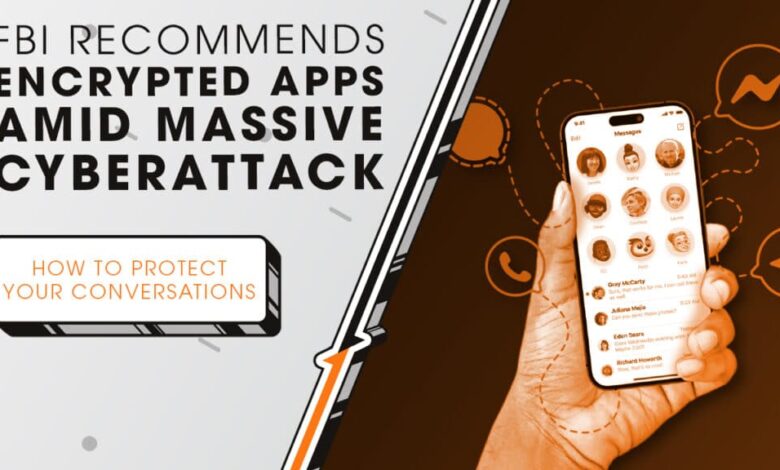Encrypted Apps Amid Cyberattacks: A Shield in the Digital Storm

In today’s hyper-connected world, Encrypted Apps Amid Cyberattacks have become as commonplace as morning coffee. From massive corporate data breaches to targeted ransomware campaigns, no one seems immune. Amid this digital chaos, Encrypted Apps Amid Cyberattacks have emerged as a critical line of defense, offering a level of security that traditional applications simply cannot match. But what makes these apps so vital in the modern cybersecurity landscape? Let’s dive in.
Understanding Encrypted Apps Amid Cyberattacks: What They Really Do
Encryption might sound like technical jargon, but at its core, it’s all about turning readable data into gibberish that only authorized parties can decode. Think of it as sending a message in a secret language only you and your friend understand. Encrypted apps use this principle to secure messages, files, and even calls, ensuring that prying eyes—even if they intercept the data—can’t make sense of it.
For example, messaging apps like Signal or WhatsApp employ end-to-end encryption, meaning that the data is scrambled before it leaves your device and only unscrambled on the recipient’s end. This prevents hackers, internet service providers, or even the app developers from accessing the contents of your communications. Essentially, encryption puts users in control of their data, reducing the chances of sensitive information being exposed during a cyberattack.
Moreover, encrypted apps are not limited to messaging alone. Cloud storage solutions, password managers, and even financial apps now use sophisticated encryption protocols to protect sensitive information. In a time when Encrypted Apps Amid Cyberattacks are becoming more sophisticated, encryption is no longer optional—it’s a necessity.
Why Encrypted Apps Are Crucial Amid Rising Cyber Threats

Encrypted Apps Amid Cyberattacks are evolving at an alarming rate. Ransomware attacks now target hospitals, government agencies, and major corporations, demanding millions in cryptocurrency. Data breaches are leaking sensitive user information, putting individuals and organizations at risk. In such an environment, traditional security measures, like passwords alone or basic firewalls, are insufficient. Encrypted Apps Amid Cyberattacks provide an additional layer of protection that can prevent hackers from easily accessing valuable data.
Encrypted apps act like a digital vault. Even if a hacker manages to infiltrate a system, the encrypted information they obtain is essentially worthless without the decryption key. This drastically reduces the risk of sensitive data being exploited for identity theft, financial fraud, or corporate espionage. For organizations, using encrypted apps is not just about protecting data; it’s about maintaining trust with clients and stakeholders.
Furthermore, encryption ensures compliance with data protection regulations. Laws like GDPR in Europe or CCPA in California require organizations to implement robust measures to safeguard personal data. Encrypted apps make it easier for businesses to meet these requirements, potentially saving them from costly fines and reputational damage in the event of a breach.
The Human Factor: How Users Can Strengthen Security
Even the most secure apps can fail if users don’t follow best practices. Password hygiene, device security, and cautious behavior online are just as important as encryption itself. Users should enable multi-factor authentication (MFA), regularly update apps, and avoid clicking on suspicious links. These habits complement encryption and create a more comprehensive defense against cyber threats.
Education is key. Many Encrypted Apps Amid Cyberattacks exploit human error rather than technical vulnerabilities. Phishing attacks, for instance, trick individuals into revealing login credentials or downloading malicious software. By choosing encrypted apps and understanding how to use them safely, users can significantly reduce the likelihood of falling victim to these attacks.
Moreover, organizations should promote a culture of cybersecurity awareness. Regular training sessions, simulated attack exercises, and clear communication about security protocols empower employees to act as the first line of defense. When users understand the importance of encryption and adopt good digital habits, the effectiveness of Encrypted Apps Amid Cyberattacks increases exponentially.
Popular Encrypted Apps and Their Advantages
Several apps have become industry standards when it comes to encryption, each offering unique features to protect users’ data. Signal is widely recognized for its open-source encryption protocol, which allows independent verification of security claims. WhatsApp, while more mainstream, also provides end-to-end encryption, making it a practical choice for everyday communication. For cloud storage, apps like Tresorit and Sync.com offer encrypted file storage, ensuring that files remain private even if servers are compromised.
Encrypted email services, such as ProtonMail, are also gaining traction. They encrypt emails so that even if someone intercepts the communication, it remains unreadable without the proper decryption keys. This is particularly valuable for professionals handling sensitive client information or confidential business communications.
Additionally, Encrypted Apps Amid Cyberattacks often come with additional features such as self-destructing messages, encrypted backups, and anonymous sign-ups. These features cater to users who prioritize privacy and security, allowing them to communicate and store data with peace of mind. In a world where Encrypted Apps Amid Cyberattacks are only becoming more sophisticated, these advantages are more than just convenient—they’re essential.
Challenges and Limitations of Encrypted Apps
While encrypted apps provide strong protection, they are not foolproof. One challenge is the potential for user error, such as mismanaging encryption keys or sharing passwords. Another is the reliance on software updates. Encryption protocols evolve constantly, and outdated apps may have vulnerabilities that hackers can exploit.
Moreover, some governments and institutions have raised concerns about encrypted apps being used for illegal activities due to their privacy-centric nature. This has led to regulatory debates and, in some cases, legal pressure on app developers to provide backdoors. However, many security experts argue that weakening encryption for law enforcement purposes inherently undermines the security of all users.
Lastly, Encrypted Apps Amid Cyberattacks can sometimes impact performance or usability. Strong encryption requires processing power, which can lead to slower performance on older devices. Users must balance convenience with security, understanding that the extra steps to ensure privacy are a small price to pay for robust protection against cyber threats.
Future of Encrypted Apps in Cybersecurity
As Encrypted Apps Amid Cyberattacks continue to grow in sophistication, encrypted apps will play an increasingly central role in cybersecurity strategies. Artificial intelligence and machine learning are being integrated with encryption technologies to detect anomalies, prevent breaches, and enhance real-time security measures. We can expect more apps to adopt zero-knowledge architectures, meaning even the app developers themselves cannot access user data.
The future also points toward broader adoption of Encrypted Apps Amid Cyberattacks across industries. Healthcare, finance, and government sectors, which handle highly sensitive data, are beginning to make encryption a standard practice. As the digital ecosystem evolves, encrypted apps will be critical not only for individual users but also for the safety and resilience of entire organizations.
In essence, encrypted apps are becoming a necessity rather than a luxury. They provide a reliable shield against Encrypted Apps Amid Cyberattacks, empowering users to maintain control over their data in an increasingly hostile digital landscape. With proper usage, awareness, and ongoing advancements in technology, encryption will remain a cornerstone of digital security for years to come.
Conclusion: Staying Safe in a Digital World
Encrypted Apps Amid Cyberattacks are no longer rare events—they are a persistent threat that demands vigilance and proactive measures. Encrypted apps offer a powerful solution, protecting sensitive data from hackers and ensuring that privacy is maintained even in the face of sophisticated attacks.
By understanding how encryption works, choosing the right apps, and adopting strong security practices, individuals and organizations can significantly reduce their exposure to cyber threats. While no system is 100% secure, encrypted apps provide a level of protection that is increasingly indispensable in our digital age.
In the battle between hackers and defenders, encryption is not just a tool—it’s a lifeline. Using encrypted apps wisely is one of the smartest moves anyone can make in a world where Encrypted Apps Amid Cyberattacks are only becoming more frequent, complex, and damaging.





